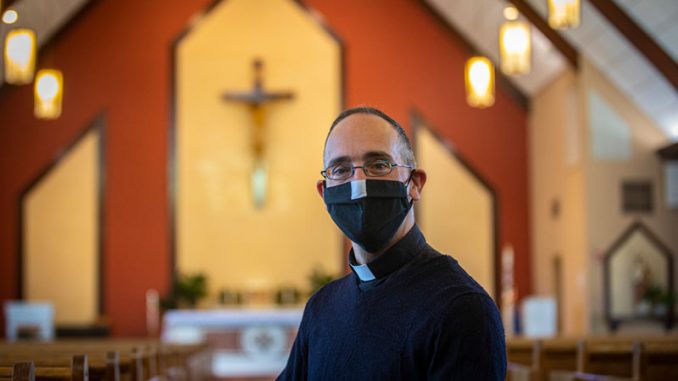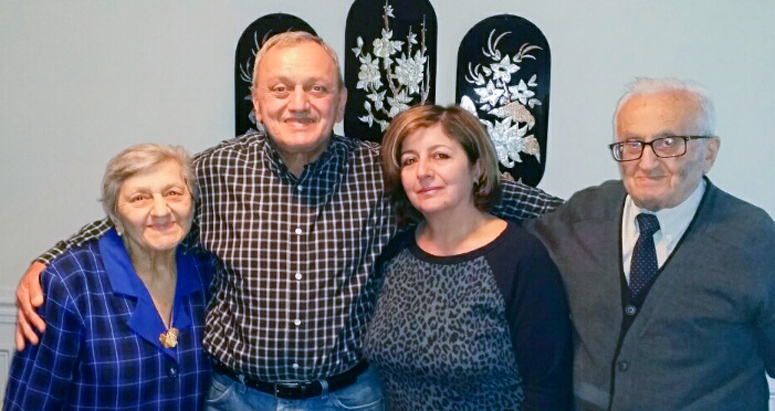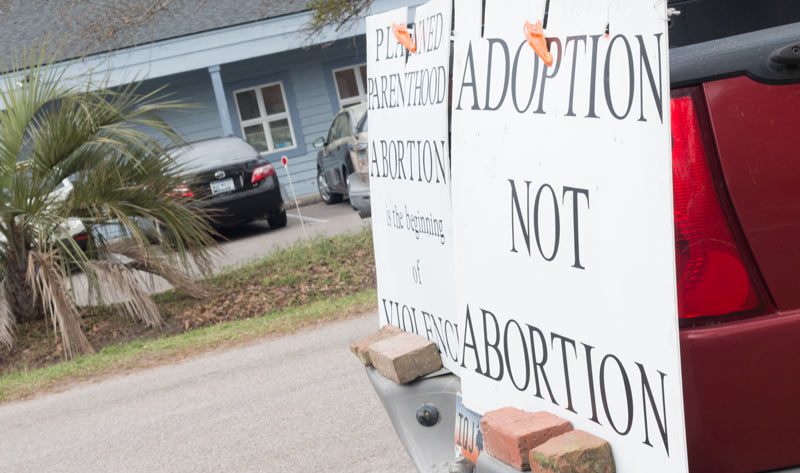
LEWES, Del.—When Father Brian S. Lewis walked into St. Jude the Apostle Catholic Church in Lewes to celebrate Mass on a recent fall Saturday evening, he was sporting a unique face mask.
Mask wearing is a requirement for most people to enter the worship space as a public safety measure during the coronavirus pandemic, so a friend of Father Lewis’ sister-in-law crafted a face covering fitting for the pastor of the Delaware parish.
It’s all black with a small white patch at the center top of the cloth, resembling the white collar on the black clerical garb most priests wear.
The “cleric” mask elicits laughter, stares, double takes and curiosity, Father Lewis told Catholic News Service during a recent interview.
“I wear it proudly, not only for the shock value and because it’s funny,” he said. “It also symbolizes something that should be on full display. Wearing the mask can be a spiritual work of mercy.”
In essence, because the mask is uncomfortable and inconvenient, it’s a form of sacrifice made to protect others from the spread of COVID-19, something the Catholic Church teaches the faithful.
As of Oct. 6, more than 210,000 people were reported to have died from the coronavirus in the United States.
The Centers for Disease Control and Prevention (CDC) strongly advise the wearing of face masks to prevent the coronavirus transmission.
After states throughout the U.S. began to allow churches to reopen for worship after months of being closed to help reduce the spread of COVID-19, many mandated face coverings for most people for these indoor gatherings.
“When the CDC, for example, or the (Pennsylvania Department of Heath) here in our state encourages mask wearing, we’re going to do it,” said Oblate Father Kevin Nadolski, vice president for mission and a professor of education at DeSales University in Center Valley, Pennsylvania. “It’s really something that’s fundamental to protecting human life. That’s important.”
Face masks don’t come without controversy.
Many Catholics view mandatory face masks at Mass as an infringement on religious liberty and believe the church is acquiescing to a political agenda of control and there are reports of some church communities in the U.S. not enforcing the requirement.
“I do understand why people don’t want to wear the mask,” said Father Mark R. Searles, a resident priest at St. Thomas More Catholic Church in Allentown, Pennsylvania, a parish that does enforce the face covering requirement for indoor worship. “I don’t particularly like wearing one either.”
However, Father Searles believes “it is something God is asking us to do right now to be safe on a very practical and physical level with an abundance of caution. A lot of doctors have said that’s the safest way to prevent the spread of disease right now.”
He also said that in charity and prayerful spirit, mask wearers could unite their sacrifice with Jesus on the cross and say: “I’m doing this out of love for my brothers and sisters, my neighbors, to keep them safe and well and just that physical sacrifice can be a spiritual one too.”
The church teaches that all human life is sacred from conception to natural death and Father Nadolski equated the wearing of masks to protect others to a pro-life issue.
However, he acknowledged that the impact of wearing a mask at Mass has been challenging, because it’s difficult to hear responses, see expressions on faces and the engagement between priest and congregant is compromised.
“The Mass is an experience, it’s a meal. The first half is storytelling and the second half is enjoying the meal,” Father Nadolski told CNS. “That’s really limiting when you can only see half of a person’s face. It limits engagement and relationships essential for the full experience of the Mass.”
That is another sacrifice being made in the age of COVID-19, Father Lewis said.
“We also remember that redemption comes through suffering and we’re called to self-sacrifice and self-gift, after Christ’s own supreme self-gift on the cross,” he said. “While I want heaven for everyone in my parish, I want it on God’s time. I don’t want to expose them to any unnecessary risk or imprudence on anyone else’s part.”
By Chaz Muth



